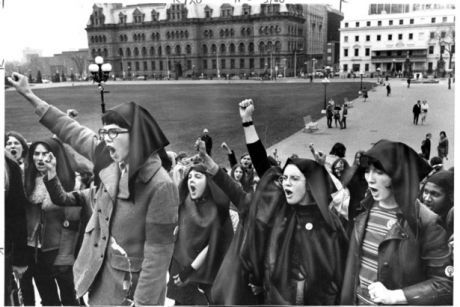Features
You are here
Canada, Quebec: How women won abortion rights

March 1, 2012
The fight for abortion rights is one of the most important victories of the women’s movement in Canada and Quebec. Even though reproductive rights are still under attack, they represent the success of a decades-long struggle for a woman’s right to control her own body.
In 1969 the Canadian government liberalized the law restricting abortion, which had been completely outlawed until then. Even after the change, abortion remained illegal, except in circumstances that threatened the mother’s health. Access to abortion was still highly restricted and almost entirely controlled by male doctors.
In 1970, the Abortion Caravan travelled from Vancouver to Ottawa, mobilizing thousands of people in support of abortion rights before engaging in civil disobedience on Parliament Hill. In the early 1970s, Dr. Henry Morgentaler, a Holocaust survivor who practiced family medicine, began performing abortions on demand in his Montreal office, directly challenging the law. He was soon arrested and jailed, but not a single jury would convict him. Nevertheless, he ended up in prison because the courts kept reversing the verdict. By 1976, the newly elected Parti Québécois government announced that it would no longer prosecute Morgentaler because it thought the law was “not enforceable.” (continues below)
The Abortion Caravan arrives on Parliament Hill in May 1970.
Morgentaler’s victory came in the context of a growing mass movement in favour of a woman’s right to choose. Trade unionists in Quebec played an important role in the struggle, providing resources for clinics and making it impossible for the government to enforce the law. As pro-choice groups asked Morgentaler to open clinics in other provinces, the women’s movement mobilized to defend him.
The movement in Canada placed the issue of abortion within a broader reproductive rights perspective. When it spoke of a woman’s right to choose, it referred to a whole range of women’s issues: the right to childcare and a decent job, an end to forced sterilizations, employment equity, birth control services in our own languages, and full access to free abortion—all of which were required if women were to have real choices.
As the movement grew, anti-choice fanatics tried to block access to the clinics. Some were even firebombed. Meanwhile, governments in the rest of Canada continued to harass Morgentaler, charging and re-charging him. In 1984, he won his fourth acquittal, but the government appealed. Morgentaler took his legal fight all the way to the Supreme Court, which tossed out the abortion law in 1988, ruling it unconstitutional.
In 1989, the abortion law was further invalidated in the case of Tremblay v. Daigle, which ruled that a fetus does not have personhood under Canadian or Quebec law, and that a woman could not be bound by an injunction from having an abortion.
The most important lesson of the pro-choice victory is the role that a mass movement of both women and men played in shaping public opinion and mobilizing broad support to secure reproductive rights. The movement even had an impact on the courts, which could not ignore the political climate in the streets. Those lessons remain relevant today as Harper steps up his attacks on a woman’s right to choose, and as younger generations of women respond to the call to defend their hard won rights.
Section:
Topics:
- Log in to post comments









